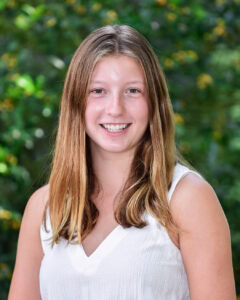September 25, 2024
Embracing Science through Yale’s Summer Program
This past summer, Sasha Dausey ’24 had the opportunity to dive deep into scientific research through a prestigious program at Yale University. As part of a selective cohort of 12 students who were interviewed to be accepted into the program, she commuted daily to New Haven, where she participated in a comprehensive exploration of data analysis and research methodologies in the field of public health.

The mornings were dedicated to statistics and coding so the students could understand their data set, and the afternoons were dedicated to research methods. “This is where the duality of the program is shown through.”
Before the class itself, the students learned some basics on their own. “There was a login to a portal which gave access to training modules, so you didn’t enter the class cold,” she said. “It was a challenge because I’d never done anything like that before, but I knew it would help me, especially since I’m taking AP Statistics this year.”
In the afternoons, Dausey shifted her focus to research methods. Her project examined autism spectrum disorder (ASD) and behavioral issues, with a particular focus on sleep disturbances and non-compliance in children. “We reviewed data from a study that tracked the impact of two special treatments over 24 to 48 weeks on children with autism,” she explains. By analyzing the data, Dausey and her group worked to see if they could replicate the original study’s results, which focused on a broader range of ASD symptoms.
Dausey’s interest in science and medicine runs deep. For the past several summers, Dausey engaged in programs to expose herself to various facets of the field. After her freshman year, she took a summer course in CPR and stop-the-bleed training. After her sophomore year, she spent two weeks on a boat conducting research, which she turned into her own research project. “The program at Yale was a great way to continue my understanding of research,” she said. “There was a good flow of the process. At Yale, I had the data, and our group turned it into something meaningful in a very professional setting.”
“It was really interesting to go back into the data and try to understand what’s going on, and then correlate that into actual results, into cause and effect,” she said. One of their findings showed statistical significance for improvements in non-compliance behavior, though there wasn’t clinical significance for sleep disturbances—a key observation that highlighted the complexity of scientific studies.
Dausey described how this experience solidified her ambition to become both a doctor and a researcher, combining hands-on medical care with the intellectual rigor of data-driven research. “I want to do both. I think understanding research is crucial for making good decisions as a doctor.”
The program bolstered other necessary skills for Sasha – collaboration and communication.“There were people who knew statistics, people who jumped at coding,” she says. “I had to find where I fit in, and I think my strength was understanding both areas and communicating them in a way that made sense for the whole group.”
In the end, Dausey’s experience at Yale was about learning new skills and affirming her passion for science. As she looks toward her future, she feels more prepared and excited for what lies ahead, both in college and in her career. “It was a hard program, but it was also a great opportunity to grow. I’ve always known I wanted to be a doctor, and this experience showed me that I also want to be a researcher. The two go hand-in-hand for me.”
